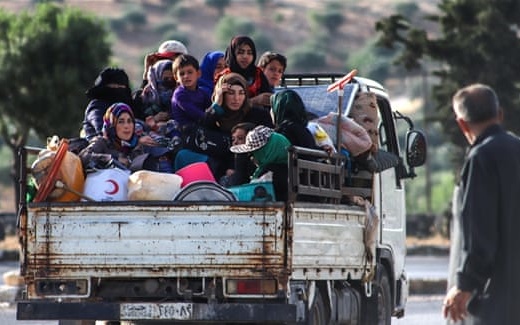Civilians in northwest Syria displaced by pro-Assad attacks (Abdulaziz Ketaz/AFP)
UPDAT£, 0925 GMT:
Elizabeth Tsurkov reports that Turkish intelligence summoned commanders of the Ankara-backed factions in the Syrian National Army to a meeting in Gaziantep in southern Turkey.
A participant said the Turkish intelligence officer overseeing Syria, Abu Said, informed commanders that Turkey is establishing a council of religious scholars to resolve disputes between factions.
He then spoke about the criticisms of the UN Commission of Inquiry, and “in an unprecedentedly harsh tone, he told the commanders to halt the abuses of civilians”.
The commanders were silent except for the head of the Ahrar al-Sharqiya faction. He was cut off by Abu Said, who blamed the “mess” on Ahrar al-Sharqiya’s killing of the Kurdish activist Hevrîn Xelef that “drew so much attention to the abuses of the factions”.
But Abu Said’s injunction was undermined by his upholding of the Amshat faction as an exemplar of good behavior. Tsurkov’s local sources have blamed Amshat for racketeering, demands for protection, confiscations of homes, and robberies.
The journalist concludes, It was apparent to the meeting participant (my source) that the reputation of the SNA and Turkey is what matters to [Abu Said], not actually halting the abuses.”
UPDATE, SEPT 20:
Ankara has rebuffed the UN Commission of Inquiry’s criticism of abuses by Turkish-backed forces in northern Syria.
The Foreign Ministry said Friday, “We categorically reject the baseless allegations of human rights violations claimed against the Syrian opposition…and concerning our country in relation to them.”
The Commission’s report condemned the Assad regime’s crimes against humanity, but it also criticized the hardline Islamist bloc Hay’at Tahrir al-Sham, Turkish-backed anti-Assad factions, and US-supported Syrian Democratic Forces for abuses.
The report, submitted to the UN Human Rights Council, said the Turkish-backed groups may have carried out kidnappings, torture, and looting of civilian property in the Afrin area of northwest Syria.
Turkey and the anti-Assad fighters overran most of the Kurdish canton of Afrin in early 2018.
UN High Commissioner for Human Rights Michelle Bachelet said, “I urge Turkey to immediately launch an impartial, transparent, and independent investigation into the incidents we have verified.”
The UN Commission of Inquiry’s Hanny Megally tells @KarwanFaidhi that many of the abuses by rebel factions in Turkey-held parts of Syria seem to be economically motivated, with unpaid or underpaid fighters using their guns to make money. https://t.co/PtlcdEClis
— Aron Lund (@aronlund) September 19, 2020
ORIGINAL ENTRY, SEPT 16: The UN Commission of Inquiry for Syria has condemned the Assad regime for killings and “grave rights violations”.
The 25-page report also cites abuses by the hardline Islamist bloc Hay’at Tahrir al-Sham, the Turkish-supported rebel Syrian National Army and the US-backed, Kurdish-led Syrian Democratic Forces.
In its latest submission to the Human Rights Council, the Commission noted a “relative reduction in large-scale hostilities”, after a March 5 Russian-Turkish agreement ended an 11-month Russian-regime offensive in northwest Syria that killed about 2,000 civilians, wounded thousands, and displaced more than a million.
But the investigators highlight “an increase in patterns of targeted abuses such as assassinations; sexual and gender-based violence against women and girls; and looting or appropriation of private property, with sectarian undertones”.
Civilian suffering is a constant and personal feature of this crisis.
Nearly a decade into the conflict, enforced disappearance and deprivation of liberty continue to be instrumentalized by almost all parties to instill fear and suppress dissent among the civilian population or simply as extortion for financial gain.
Regime “Crimes Against Humanity”
The report criticizes pro-Assad forces, responsible for more than 90% of the 100,000s of slain civilians in the 114-month conflict, for “recent cases of enforced disappearance, torture, sexual violence, and deaths in custody ]that] amount to crimes against humanity”.
The Commission warns that “the continued use of these abhorrent practices” in southern Syria, reoccupied by a Russian-enabled regime offensive in July 2018, has led to an escalation of violence. More than 500 people, many of them regime troops or “reconciled” anti-Assad actors, have been slain in assassinations and targeted killings since the reoccupation of the area, the first to rise against the regime in March 2011.
The investigators also say the Syrian National Army “may have committed the war crimes of hostage-taking, cruel treatment and torture, and rape” in Afrin in northwest Syria, seized from Kurdish factions in early 2018. It noted the killing and maiming of scores of civilians by bombings and shelling.
Implicit Criticism of Russia and the US
Without citing Russia or the US, the Commission implicitly criticized both for adding to the suffering of civilians.
“Living conditions across the country remain deplorable and in some cases are worsening” amid Coronavirus and eocnomic crisis, the Commission summarizes.
In large swathes of Government-controlled areas, barriers to return are omnipresent with civilians being deliberately prevented from returning to their houses and exercising proprietary and other economic and social rights.
It cites the sanctions of the US and the European Union, imposed on the Assad regime over its crimes against humanity and the killing of detainees. Although the Commission does not name Russia, which used its UN Security Council veto to shut down cross-border aid into opposition and Kurdish areas, it declares, “All barriers to the provision of humanitarian aid must be removed.”
The investigators challenge the long-term internment of Islamic State fighters and their families in camps in northeast Syria, overseen by the US-backed Syrian Democratic Forces, as “unlawful deprivation of liberty in inhumane conditions”. The acknowledge “the vast complexities of the situation”, but urge repatriation of foreign nationals as “the deprivation of liberty of civilians cannot continue in perpetuity”.
See UPDATED: All Australian Women and Children Moved From Al-Hawl Camp in Northeast Syria
The report’s recommendations include a long-term nationwide ceasefire; immediate, large-scale prisoner releases; and “urgent, comprehensive steps” by the Assad regime “to reveal the fates of those detained or disappeared”.

